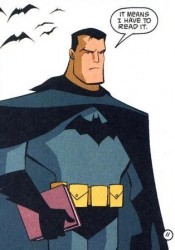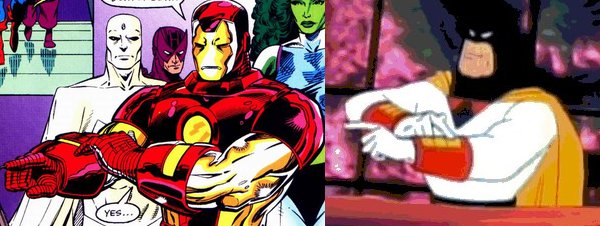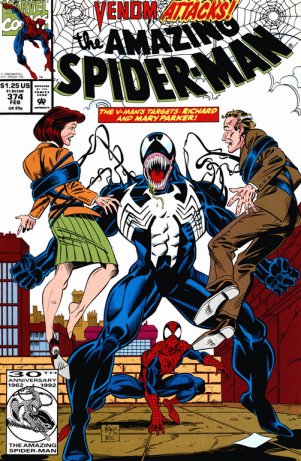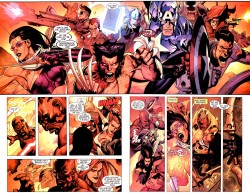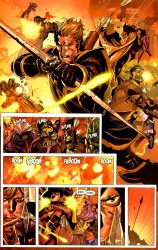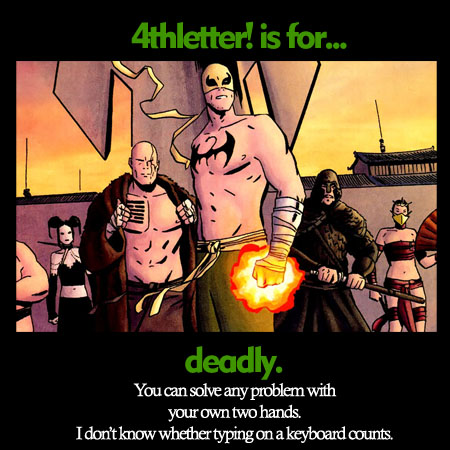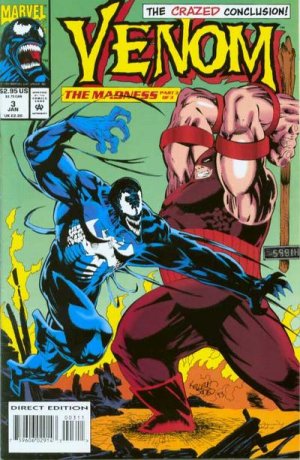I was raised in a black, church-going, military family. My grandfather did 30 years in the Air Force, my mom did a few, my dad was in Gulf War I, I’ve had various relative enlist, and it seems like everybody I knew from high school is either married or joined some branch of the military. I guess all of this is just to say that I’m not coming at Amazing Spider-Man #574 from the position of a total neophyte or someone who doesn’t know nothing about nothing. I tend to pay attention to those things, if only because all three things are so close to my heart.
The crux of ASM #574 is that Flash Thompson was sent to Iraq, with the surprise revelation that he lost his legs rescuing a fellow soldier. The issue tells the story of Flash’s motivations during the story, even while massaging continuity (Vietnam quietly replaced with an unnamed jungle) and bringing the character up to date.
Overall, I really enjoyed the issue. Other than one hollow note (the origin of the name Flash comes from a high school date), this is probably Guggenheim’s strongest piece of writing to date. Careful attention is paid to the reality and treatment of the military in the book, including a desk-driving general and slang. These aren’t your cardboard cut-out soldiers. We don’t get the guy with the kid at home, or the crazy war-thirsty jerkoff. The little attention given to them paints them as just regular people.
It’s Flash’s story, though, and the issue is mostly told in the first person, as Flash tells his story to the general who is reviewing him for a Medal of Honor. It’s in an issue of Spider-Man because Flash is Spidey’s number one fan, and the text shows how Spider-Man has influenced Flash’s life over the years. When Flash needed a hero, his abusive father was found lacking. Instead, he looked to Spider-Man, resulting in iconic shots of Spider-Man versus the Sinister Six, or lifting a heavy thing, or fighting the Kingpin head-on, and so on, when Flash needed that extra motivation.
It isn’t clear in the text whether Spidey was on his mind during the action itself, or simply making parallels in the retelling, but both work thematically. Guggenheim is walking a fine line here, and could easily tip over into equating the exploits of Spider-Man, a fictional character, with the very real soldiers over in Iraq, Afghanistan, and elsewhere. Instead, I found that it was just a story about where heroism comes from.
Everyone has someone or something that they look up to. It’s that person in the back of your mind who inspires you, or whose memory you want to live up to, whether it’s What Would Jesus Do or I Wanna Be Like Mike. It’s a very human thing to look outside yourself for strength, and I think that this book does a good job of doing that. Flash’s father was abusive, so he was right out as far as heroes go. Spider-Man, however, was young, capable, and an easy target for a young guy who needed help. Flash latched on and became a huge fanboy. When he needed to push, he could look to Spidey.
I can see how this could ruffle some feathers, but I thought it was done perfectly respectfully. Nowhere is anyone but Flash’s motivations attributed to Spider-Man, and it’s always in an inspirational manner. It isn’t about how awesome Spider-Man is, but rather about how important heroes are to people, albeit illustrated on a very small scale.
This issue prompted me to put some real thought as to whether or not it was appropriate for comics, and superhero comics in particular, to address real world issues. One man’s “respectfully handled” is another man’s “complete travesty.” Why can we do World War II comics by the boatload, but more modern issues are taboo? Is it the time and distance that separates us and makes it seem less real? Is the War on Terror, or Insert Cause/Injustice/Action of Your Choice Here, somehow more real and troubling than the Big One?
I don’t think so, and I think this issue is a good reason why. If you can do your best to treat an issue respectfully, do the research (we can call it “due diligence” so we can pretend to be adults), and generally just put your best foot forward, I don’t think that any subject is taboo.
I believe that fiction is important. As much as I hate to quote a Superman comic to support a point, I have to say that one of my favorite Superman moments is in Action Comics #775, where Superman defeats the hot cynical superteam of the moment and says, “Dreams save us. Dreams lift us up and transform us.”
The fictional nature of something does not decrease its importance any more than relating something fictional to something real insults the real thing. Sometimes you have to push toward that fictional ideal to get the job done. Sometimes it’s your father, sometimes it’s Spider-Man. There is little difference between the two, and both serve different purposes for different people. Sometimes, dreams are just what you need.
I’ve personally known people who were big on the Punisher, Sgt Rock, or (X character) who spent some time in Iraq. We didn’t spend a lot, or really any, time talking about how the adventures of Clint Barton helped them in the field, but people generally have pet heroes, or tattoos of heroes, for specific reasons. One guy in Iraq using Spider-Man as inspiration? I can buy that.


